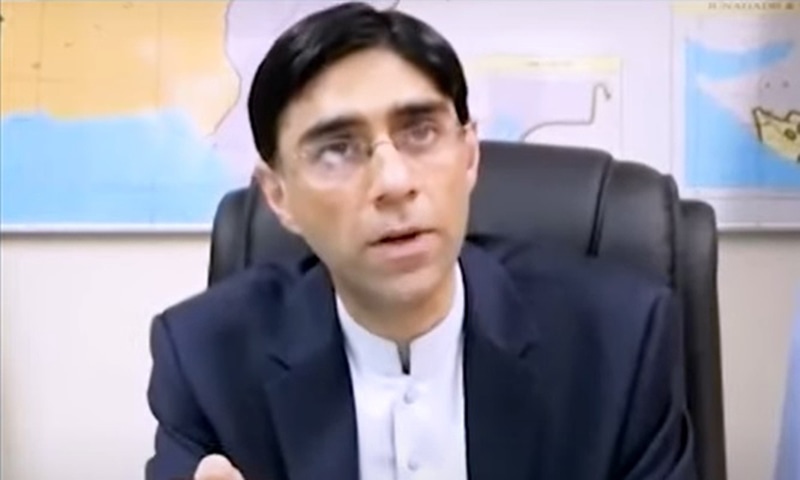National Security Adviser (NSA) Dr Moeed Yusuf on Saturday said Afghanistan was forced to become a “sanctuary for terrorists” by India in the past 20 years to fuel terrorism in Pakistan, emphasising that “it must now stop”.
In a virtual interview with The Wire journalist Karan Thapar, Yusuf said Pakistan won't accept if India deploys its people in Afghanistan in the garb of development workers and uses them to incite terrorism in Pakistan, adding that Afghanistan should never become a sanctuary for terrorists.
The NSA said a window for improved relationship between Pakistan and India was open but insisted it was India that had to create the “enabling environment”. The security adviser added that many voices in Pakistan were sure that the incumbent Indian government won’t let this happen.
He said India would miss a “once-in-a-lifetime” opportunity if it failed to take up this chance for the region to move forward with the current civil and military leadership of Pakistan.
In response to a question about a prospective Afghan government, Yusuf said Pakistan would welcome whatever Afghans decide for their future. “We have no favourites, and no line on who should go where. If anybody tries to impose from outside, it will not work,” he emphasised.
He insisted that Pakistan would keep trying to facilitate a political settlement in Afghanistan.
When asked if Pakistan would recognise Taliban if they grab power militarily, Yusuf said “we will see how the international community reacts and take the decision accordingly.”
The host also asked whether Pakistan would seal its border with Afghanistan if Taliban took over Afghanistan. The NSA underlined it was unlikely to take place, adding that any decision taken by the prime minister would be implemented.
‘Backdoor’ meetings
The NSA was also posed a question on whether he held a secret meeting with his Indian counterpart Ajit Doval in Dubai. Yusuf replied in the negative. He, however, said the Indian side had made contact with Pakistan.
Discussing the “backdoor channels” for talks, the interviewer asked whether the Chief of Army Staff Gen Qamar Javed Bajwa also met Ajit Doval recently. The NSA responded: “Intelligence-level contacts happen even in the worst of circumstances … who was there from the Indian side, I would protect that because that’s for India to decide if it wants to reveal or not, and if I be brutally honest, it would also reveal who really calls the shots in India, so it's better for them to decide.”
At this, Thapar asked the NSA whether he was implying the meeting between the COAS and Ajit Doval did take place. Yusuf said he was not suggesting that.
The NSA said Pakistan wanted to move forward with India “but unfortunately, as the PM remarked, the RSS ideology has come in the way.”
“For Pakistan, there are two main concerns, one is Kashmir, as it has always been and it will always be there till the Kashmiris get their right to self-determination in the light of UN resolutions.”
He highlighted that Pakistan’s second core concern was terrorism, saying “this is an important facet of Pakistan’s policy towards India. We need India to understand that we know it is perpetrating terrorism against Pakistan in Pakistan and this is unacceptable”.
Yusuf said any third party that wanted to come in to help resolve the Kashmir issue between Pakistan and India in line with the UN resolutions was welcome. “Third parties have made contacts with Pakistan all the time because the world is worried,” he said.
Responding to a query on whether any third party actually intervened to resolve the lingering dispute, the NSA said he sensed that there was some pressure put on India, adding “I can’t confirm that because I wasn’t a part of it. India can speak on it.”
He emphasised that Pakistan was moving in a direction where it wanted connectivity and peace with the world.
The NSA clarified that Pakistan wanted to move forward on Kashmir, but it would not do so at the expense of Kashmiris and their lives. “Our position remains firm to the UNSC resolutions, until the right to self-determination is granted,” he added.
“The Kashmir situation has not normalised for two years.”
India must take steps on the ground
Yusuf said one may test sincerity by seeing whether India did the minimum required to at least start a conversation on how to resolve Kashmir. “Second, we would want India take some steps on the ground.”
The NSA added that an illegal change on Aug 5, 2019, had to be reversed for a start of a conversation on how to grant Kashmiris their right to self-determination.
He went on to say: “You cannot expect India to continue perpetrating terrorism in Pakistan and hope that Pakistan closes its eyes because the global narrative is on your side.”
He said if anyone in India or elsewhere thought that Pakistan’s conciliatory narrative on moving forward was signaling that Pakistan would just forget Kashmir and move on, “those people are living in fool’s paradise.”
He reiterated that there was a basket of things on Kashmir and India had to cease perpetrating terrorism against Pakistan “for us to know India is sincere”.
Mentioning a recent bomb blast in Lahore, Yusuf said Pakistan had all traces and evidences of elements based in India connected with recruiters in a third country that planned the foul play.
When asked to name the mastermind in public, the NSA said everybody will hear this on TV in detail “when the time is right”.
Lashing out at the Indian government for its “role to harm Pakistan” internationally, he added that Indian external affairs minister had publicly said that India ensured Pakistan remained on the FATF grey list.
He said it was also worrying that India tapped the [mobile phone] of Pakistan’s prime minister.













































